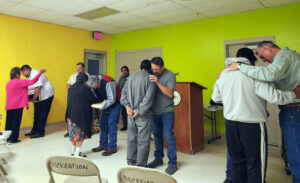
FORT WORTH, Texas (BP)–You may think your state is immune from the cultural earthquake that pushed our culture even farther from its historical roots with the ruling of the Massachusetts Supreme Judicial Court in Goodridge v. Department of Public Health.
Think again, even if you live in one of the states that have enacted some version of the Defense of Marriage Act (DOMA).
In its Nov. 18 ruling, the court equated sexual preference with race, describing laws against same-sex “marriage” as no different than laws that once forbade interracial marriage. That means that gay couples, according to the Massachusetts court, have the right to get married. Short of amending the state constitution to forbid the practice, the Massachusetts legislature will have no choice but to make laws enabling same-sex “marriage.”
Let’s imagine Steven and John, a quiet homosexual couple who live in Boston. Sometime after their legislature follows the order issued in the Goodridge case, Steve and John apply for a marriage license and get married. Later, they move to Texas when Steve gets a job transfer. While in Texas, Steve makes a will leaving his entire estate to “my spouse.” Steve dies.
John probates Steve’s will. The Texas probate court looks at the will, looks at John, and rules that John receives nothing under the will because Texas does not recognize same-sex marriages. Infuriated, John files a lawsuit against Steve’s estate and against the state of Texas. The basis of his lawsuit would be that Texas must give full faith and credit to the marriage decree issued by Massachusetts because of Article 4 of the U.S. Constitution.
An Article 4 argument about full faith and credit raises a federal issue to be resolved by federal courts and, ultimately, the U.S. Supreme Court. If the Supreme Court rules in favor of John, Defense of Marriage Acts enacted by the states would be overturned and every state would have to recognize same-sex marriages legally performed in Massachusetts as constitutionally protected.
There are dozens of other scenarios under which Steve and John could get married in Massachusetts, move to a DOMA state and challenge its constitutionality under the full faith and credit clause.
With the Goodridge decision, the war over same-sex marriage in the United States is all but over. The biblical view of marriage in American law has been buried in the shifting sands of our culture.
One response evangelical churches can make is the one made by some mainline Christian denominations. We can revise the traditional view of homosexuality. In the name of love and tolerance, we can recognize no distinction between committed homosexual relationships and committed heterosexual ones. The problem with this stance is that it requires us to turn our backs on the truth of Scripture.
Another response evangelicals can make is to hide behind the walls of our homes and churches. We can dig moats and build strong barricades between ourselves and the rest of the world. We can preach our sermons to congregations of likeminded Christians, and pray the stain of sin spreading through our country does not taint us. The problem with this stance is that it fails to fulfill Christ’s mandate to “make disciples of all nations.”
Neither of those responses is going to reach the lost world for Christ. Neither of those responses is going to redeem hurting gay men and women from their painful lifestyle.
Evangelicals must first admit that we live in a culture that is at best post-Christian and at worst anti-Christian. We must then learn how to relate to this culture. We must be missionaries in our own country. Fortunately, we do not have to learn a foreign language. But we do have to be grounded in the principles of our faith.
The true, orthodox Christian message of hope and redemption from sin must be infused into our culture. Each American Christian must unapologetically speak out against revisionist views of marriage and the gay agenda. Instead of saying, “We believe homosexuality is wrong,” we need to say, “Homosexuality is wrong.” It is wrong not because we believe it is wrong; it is wrong because it goes against the character and nature of God. Homosexuality is wrong whether or not we believe it.
The only way we can recover a biblical view of marriage in American law is to amend the U.S. Constitution. Many conservative Republican leaders in Congress oppose amending the Constitution on philosophical grounds. However, the Goodridge decision gives concerned Americans no other choice. Unless you agree with the direction American courts are taking on this issue, you must urge your senators and congressional representatives to support a constitutional amendment defining marriage as involving one man and one woman.
A strong, principled, biblical stance in the face of our lost culture will invite persecution. Jesus was persecuted by His culture, too. We will be called bigots and small-minded “right wingers.” Jesus was called a heretic and a follower of Satan.
Are you ready for the next big step? If we are to successfully take the next big step, we will have to walk in Jesus’ sandals. We should put on the whole armor of God. We will have to stand together and bring the Gospel message to our lost and dying culture.
–30–
Brent Thompson is associate director of communications at Southwestern Baptist Theological Seminary. Thompson practiced law in Alaska and Texas before coming to seminary and has argued before the Alaska Supreme Court.
















